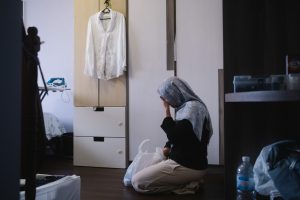All images courtesy of PPIS unless otherwise stated.
This story is part of RICE Media’s Storytellers partnership with the Singapore Muslim Women’s Association, or PPIS (Persatuan Pemudi Islam Singapura).
PPIS Vista Sakinah presents a story about blended families in Singapore. Produced by Siti Aminah Amin & Nur Thahirah.
Can stepfamilies, with their own set of dynamics and challenges, thrive as any other type of family?
In 2021, 19.5 percent of marriages in Singapore comprised remarriages for one or both partners. Within the Muslim community, 39.5 percent of marriages are remarriages.
The occurrence of remarriages increases the likelihood of stepfamilies—also known as blended families—forming when two people come together and bring a child or children from previous marriages.
According to a 2012 quantitative survey titled ‘Remarriage in the Malay Community: An Exploration of Perceptions, Expectations and Adjustments to Stepfamily Living’, published by PPIS, the main reasons for remarrying after divorce include love, attraction, and companionship.
The survey also highlights the importance of the new partner accepting one’s children as a motivator for remarrying. From our experience, another important reason for remarrying is the acceptance of children by the new spouse.
However, based on counsellors’ experience dealing with remarriages, the idea of remarrying someone with children is still associated with scepticism and sometimes discrimination, both from those in the Muslim community and outside.
Stepfamily Stigma
“For me, [I remarried for] my daughter; it was time for her to have a dad. She needs a father figure”, *Siti explains.
Once divorced and now remarried, she was hopeful about building a strong bond between her daughter, *Nina, and her new husband despite their non-biological relationship. As a single mother, *Siti struggled to manage alone and had felt the need to remarry so that she could have someone to share the responsibilities of parenting and also to build a ‘complete’ family.
However, she had to first get past an unexpected obstacle: Her mother, *Salmah.
Remarriages require a more complex family-building strategy than first marriages. Once a divorced and remarried woman herself, *Salmah’s perspective of remarriages and blended families continues to be clouded with judgment from her tragic past.
When *Salmah remarried a man with children from her previous marriage, she found that he could not love her children like his own and found it difficult to forge strong ties with her children.
*Salmah’s unsuccessful attempt at uniting her own blended family convinced her that any stepfamily unit is bound to fall apart. Her preconception is so strong that it is projected onto her daughter’s newly formed stepfamily. For example, in terms of how her grandchild relates to her stepfather.
While blended families continue to be a significant part of the family landscape in Singapore, the ‘step’ in ‘stepfamilies’ still carries a stigma that paints non-biological bonds in a negative light. The absence of blood relation seems to be regarded as problematic and dysfunctional.
“I just want my family to be united,” *Siti says, taking a deep breath.
Negotiations and compromises around conflicting expectations between members of a blended family are just the tip of the iceberg when it comes to the psychological pressure they go through to make things work.
In the case of *Siti, her desire for a harmonious family was impeded by her mother. Siti saw *Salmah as successfully putting *Nina in a loyalty bind when she introduced the idea that a stepfather can never equate to her biological father.
To better navigate the situation, *Siti sought the help of PPIS Vista Sakinah, which renders social services to enhance the quality of family life for remarried couples with children from previous marriages.
At PPIS Vista Sakinah, social workers and counsellors are trained to conduct remarriage preparation courses, private consultations and workshops for stepfamilies. The purpose of such services is to guide members through the foundational aspects of building a stable blended family—to empower women and children from non-conventional family backgrounds.
There are many other young children out there who, like *Nina, are internally conflicted when finding the balance between acceptance of new family members and guilt towards the past ones.
Lending a voice to their unspoken thoughts can go a long way in developing healthy ways of dealing with challenges that may arise within the family.
Must Blended Always Mean Broken?
Unfortunately for *Siti, *Nina submitted under the pressure of *Salmah and made the decision to leave the family to stay with her grandmother.
The family differences came to a disappointing end as *Salmah’s distorted beliefs on remarriages and stepfamilies trump her daughter’s will to fight for unity within the family.
*Siti is not alone in her internal conflict. *Zahirah, a 32-year-old divorcee and mother of one, is yet another example of a woman fighting all odds to ease into her newly married life with a divorced father of one.
She, too, resorted to counselling sessions at PPIS Vista Sakinah to voice out her concerns about an unaccepting mother-in-law and attention-deprived son.
The bigger picture here is that the attitude surrounding the concept of stepfamilies is widespread, even amongst women in the community themselves, as seen in the case of *Salmah. When love blooms and the hope to rebuild a family arises, baggage will always follow.
As times progress, so should our society’s traditional viewpoint on the definition of a family unit.
Non-traditional family arrangements should be positively embraced to encourage and advocate for healthier relationship-forming between individuals from diverse family background circumstances.
To be fair, nobody gets taught how to navigate the complexities of relationships in a stepfamily. Support organisations such as PPIS are essential in fostering public support for such family units to sustain healthy and happy ties.
Strong and stable families are the bedrock of our society. Strong families nurture resilient individuals who, in turn, can make important contributions to society.
*Names have been changed.






